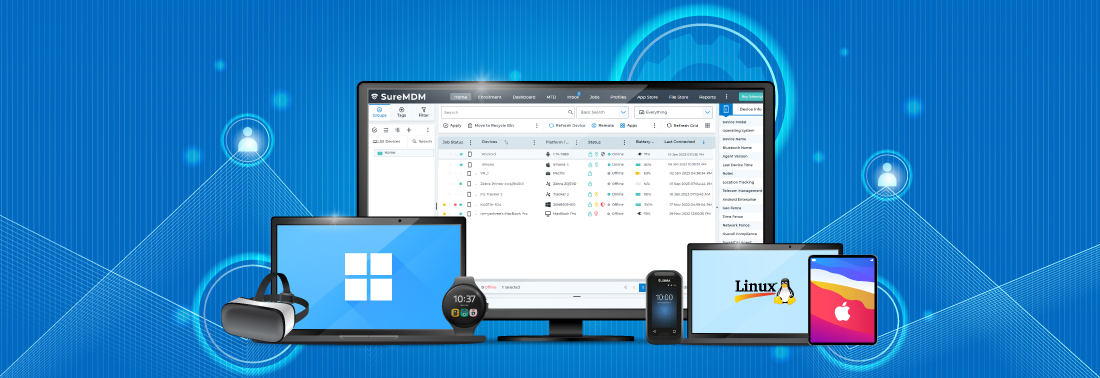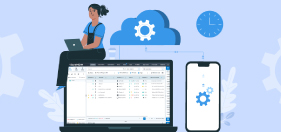Why SureMDM is the perfect multi-platform MDM solution you need to manage diverse device ecosystems
jun 05, 2024 | 42Gears Team
As technology continues to drive enterprise and business innovation, IT administrators need to implement a host of solutions to empower and support their expanding workforce. Mobile device management (MDM) is one key solution that many businesses leverage for enabling data integrity, device security and simplifying their device management responsibilities.
But what happens when businesses need to rely on different types of devices that run on different operating systems? Does this mean businesses may have to implement multiple MDM solutions? More importantly, can leveraging multiple MDM solutions cause complications and inefficiencies for IT operations?
For instance, a few MDM solutions support only Apple devices, whereas other multi-platform device management solutions may claim to offer multi-platform support capabilities like Android and Windows, but not offer MDM capabilities for legacy devices, Linux, ChromeOS, Wear OS, and IoT devices. Additionally, businesses may need to leverage an additional MDM solution to support legacy devices. In such scenarios, businesses may be forced to implement multiple MDM solutions to cater to their ever-expanding, diverse fleet of endpoints and devices.
Is there a better way to simplify this approach to device management? More specifically, is there a multi-platform MDM solution that can manage and troubleshoot large fleets of devices running on different operating systems?
Before we address these questions, let’s explore how diverse the device landscape can be for different industries and why it’s essential for businesses to find a way to address these challenges.
What are the different types of devices and operating systems used by industries?
Today, most industries primarily use mobile devices and tablets for their operations. However, due to the nature of the operations involved and industry-specific requirements, businesses will need to use specialized devices that streamline their operations.
Here is a quick rundown of the different types of devices used by different industries:
Retail
- Mobile Point-of-Sale Systems: Point-of-Sale (POS) devices are widely used across the retail industry to enable speedy transactions. Cashiers primarily use this type of device to process purchases faster, which results in retailers improving their customer experience by drastically cutting down wait times.
- Rugged Devices: Rugged devices have been specifically designed to operate in harsh and dangerous conditions. Such devices will usually have a tough exterior to protect internal hardware components and have a high tolerance for extreme temperatures and high elevations. In retail warehouses, staff members use rugged devices to avoid any damage from accidental drops, for tasks like inventory management.
- Barcode Scanners: These types of devices help retailers improve checkout efficiency and keep track of their inventory.
- Digital Signage: Popularly used in retail stores, digital signage devices are used to display product information and promotions.
Healthcare
- Smartphones & Tablets: Healthcare practitioners and staff leverage mobile devices and tablets for simplifying and streamlining a host of activities, like patient check-in, accessing Electronic Health Records (EHRs), intra-department communication, video conferencing, and administrative tasks.
- Wearables: These devices are increasingly used by healthcare providers to monitor patient vitals, and facilitate self-care treatments.
- Rugged Devices: Rugged tablets and laptops are used by medical practitioners working out of remote locations since rugged devices offer protection against accidental drops and harsh environmental conditions.
- VR Wearables: Medical professionals use VR for facilitating immersive internal training sessions, like surgical simulation training.
Transportation & Logistics
- Smartphones & Tablets: Transportation and logistics companies use smartphones and tablets for fleet management, warehouse management, and delivery management.
- Rugged Devices: Rugged phones and tablets are used by logistics personnel and delivery drivers to track packages and navigate routes to delivery points.
- IoT Devices: Primarily used for fleet tracking, fleet management and route management, IoT devices improve operational efficiency, and help achieve compliance in the form of ELD.
Field Services
- Smartphones: Field service workers use company-issued smartphones for communication, tracking service requests, capturing photos or video recordings of service, and accessing sensitive information.
- Rugged Devices: Like other industries, field service workers leverage rugged devices since on-site technicians work in dangerous environments like construction sites.
When it comes to operating systems, most devices run on Android, Windows, iOS, and Linux. Let’s take a quick look at why certain operating systems are preferred for a particular activity:
- Android: Commonly adopted by businesses across industries for its affordability and flexibility, Android is primarily used on scanners, tablets (for employee use and customer-facing purposes), and POS systems.
- iOS/iPadOS: iPads are used for activities that require secure access to sensitive information, like processing payments, and accessing sensitive information like EHRs for healthcare businesses, etc.
- Windows/macOS/Linux: Primarily run on laptops and desktops, Windows is used for office and administrative functions that require laptops. Mostly used in embedded systems, Linux offers IT admins the ability to fully configure and customize their devices to specific requirements. Red Hat Enterprise Linux (RHEL), Oracle Linux, Ubuntu, and Fedora are some commonly used Linux distros by enterprises and businesses.
- Windows Mobile/CE: Though no longer supported by Microsoft, Windows Mobile and Windows CE are still used in certain handheld and embedded devices, like PDAs and Industry Automation Devices.
Overwhelmed with too many devices running on different operating systems? Simplify your multi-platform MDM requirements with SureMDM!
Regardless of which industry you’re in, you shouldn’t have to use multiple mobile device management solutions to manage each device platform. However, MDM solutions are meant to simplify device management, and leveraging multiple MDM solutions from different providers can create unnecessary complications.
And that’s where SureMDM comes in!
Choose SureMDM: A true multi-platform MDM solution
SureMDM supports all major platforms, including Android (Android Enterprise Gold Partner), Windows 10, Windows 11, iOS, iPadOS, macOS, Linux, Wear OS, VR, ChromeOS, Apple TV, and legacy devices. This is one of the reasons why over 18,000 (and growing) customers prefer SureMDM, as IT admins can provision, secure, and manage their diverse ecosystem of devices from a single, unified console.
SureMDM supports cloud-hosted, on-premise, or dedicated SaaS deployments. This ensures companies can seamlessly set up SureMDM with minimal downtime and disruption to their existing operations.
With multi-platform MDM capabilities, consistent new feature updates like Indoor Location Tracking and Mobile Threat Defense, support for legacy devices, and industry-leading technical support, SureMDM is the platform that’s constantly evolving to cater to your dynamic business needs. If you’re in a situation where you may need to leverage multiple MDM solutions, we recommend you try SureMDM first for your multi-platform MDM requirements.
Interested in testing SureMDM for your
diverse fleet of devices?
Subscribe for our free newsletter








